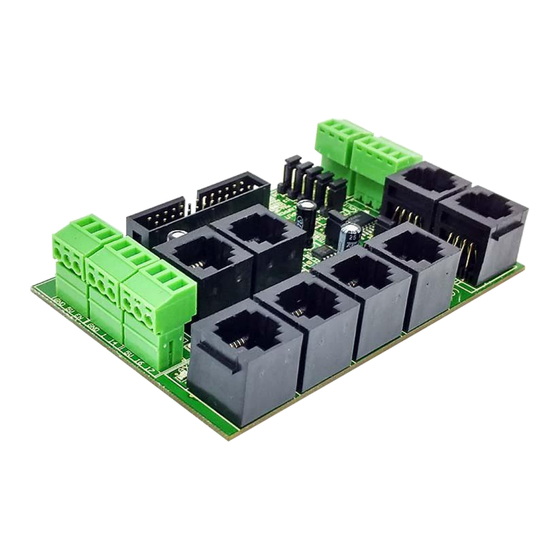
Subscribe to Our Youtube Channel
Summary of Contents for CNC4PC C35S
- Page 1 USER’S MANUAL VER.2 C35S- QUICK SETUP BREAKOUT BOARD Rev. 2 MARCH 2018 User’s Manual Page i...
-
Page 2: Table Of Contents
USER'S MANUAL TABLE OF CONTENTS Contents Page # OVERVIEW ........................1 FEATURES ........................1 SPECIFICATIONS ......................2 BOARD DESCRIPTION ....................2 SPECIFICATIONS ......................3 Power Requirements ....................3 SELECTION JUMPER ....................3 Input (PULL-UP or PULL-DOWN) ................3 Pin_11......................... 4 ESPECIAL FUNCTIONS .................... -
Page 3: Overview
RJ45 for connections. This version of the C35can be easily mounted on control boxes using DIN rails and can also accommodate ribbon cables or DB25 connectors. FEATURES • IEEE 1284 Standard compatible. • Easy connections with CNC4PC relay boards and speed control boards. • Microcontroller based SCHP. -
Page 4: Specifications
SPECIFICATIONS DIGITAL INPUT SPECIFICATIONS On-state voltage range 2 to 5V DC Maximum off-state voltage 0.8V Maximum operation frequency 4 MHz Typical signal delay 10nS DIGITAL OUTPUT SPECIFICATIONS Maximum output voltage 5VDC Typical output current 50mA Maximum off-state voltage 0.44 V Maximum operation frequency 4 MHz Typical signal delay... -
Page 5: Specifications
SPECIFICATIONS Power Requirements It requires a 5VDC @ 500 milliamps power supply to operate. This power can be taken from the computer’s power supply or USB port. Consider using the A3 – USB Power Cable found under Accessories in the website. WARNING Check the polarity and voltage of the external power source and connect the 5VDC and GND. -
Page 6: Pin_11
Pin_11. If you connect sensors (A32 or A62), set jumper as sample in the image If you connect board (C3 or C48), set jumper as sample in the image User’s Manual Page 4... -
Page 7: Especial Functions
ESPECIAL FUNCTIONS Safety Charge Pump "SCP". (Pin 17) This board takes advantage of Mach ability to send a specific frequency through one of the pins of the parallel port when the program is in control of the system. CNC machinery can be very dangerous, and you could have a risk of the machine doing something different that what you intend the machine to do if the program loses control of your system. -
Page 8: Enable Pin
Selecting the SCHP operation mode The Safety Charge Pump can be activated or deactivated depending on the jumper position. 1-2: ON 2-3: OFF Note: When the Safety Charge Pump is activated, the EN terminal is active and a valid SCHP signal is present, pin 17 will go high. This high signal can be used to enable other external devices, such as enabling other Breakout Boards, or relays that would enable servos, VFDs, contactors, etc. -
Page 9: Functional Block Diagrams
FUNCTIONAL BLOCK DIAGRAMS Pins 2-9 simplified block diagram Fig. 2 Simplified functional block diagram for pins 2-9. Pins 1,14,16 and 17 simplified block diagram Fig. 3 Simplified functional block diagram for outputs 1, 14, 16 and 17. Note: “Internal Enable” = “External Enable Pin” AND (“SCHP” OR “Bypassed SCHP”) The “Internal Enable”... -
Page 10: Inputs Simplified Block Diagram
Inputs simplified block diagram Fig. 4 Simplified functional block diagram for inputs. PINOUT User’s Manual Page 8... -
Page 11: Wiring Diagrams
PINS USED ON EACH RJ45 CONNECTOR. RJ45_1 RJ45_2 RJ45_3 RJ45_4 RJ45_5 RJ45_6 RJ45_7 RJ45_8 Function Function Function Function Function Function Function Function RJ45 PIN 1 Not Used Not Used Not Used Not Used RJ45 PIN 2 P.P. Pin 2 P.P. Pin 4 P.P. -
Page 12: Connecting Npn Sensors
10.2 Connecting NPN sensors. Fig. 6 Wiring diagram to connect NPN open collector proximity sensors. Fig. 7 Wiring diagram to connect in parallel NPN open collector proximity sensors. Connecting NPN open collector proximity sensor with the C35S R1 Value (12V) R1 Value (24V) Approx. - Page 13 Some NPN proximity sensor has a pull-up resistor (R1) internally. It is necessary to know its value in order to connect safely the sensor with the BOB. Follow this recommendation: Connecting NPN open collector proximity sensor with the C35S (R1+R2) Value (12V) (R1+R2) Value (24V) Approx.
-
Page 14: Connecting Pnp Sensors
10.3 Connecting PNP sensors. Fig. 10 Wiring diagram to connect PNP proximity sensors Connecting PNP proximity sensor with the C35S R Value (12V) R Value (24V) Approx. 10KΩ Approx. 25KΩ User’s Manual Page 12... -
Page 15: Dimensions
11.0 DIMENSIONS All dimensions are in Millimeters. Fixing holes (3.8mm). DISCLAIMER Use caution. CNC machines can be dangerous machines. Neither DUNCAN USA, LLC nor Arturo Duncan are liable for any accidents resulting from the improper use of these devices. This board is not a fail-safe device and it should not be used in life support systems or in other devices where its failure or possible erratic operation could cause property damage, bodily injury or loss of life.

Need help?
Do you have a question about the C35S and is the answer not in the manual?
Questions and answers